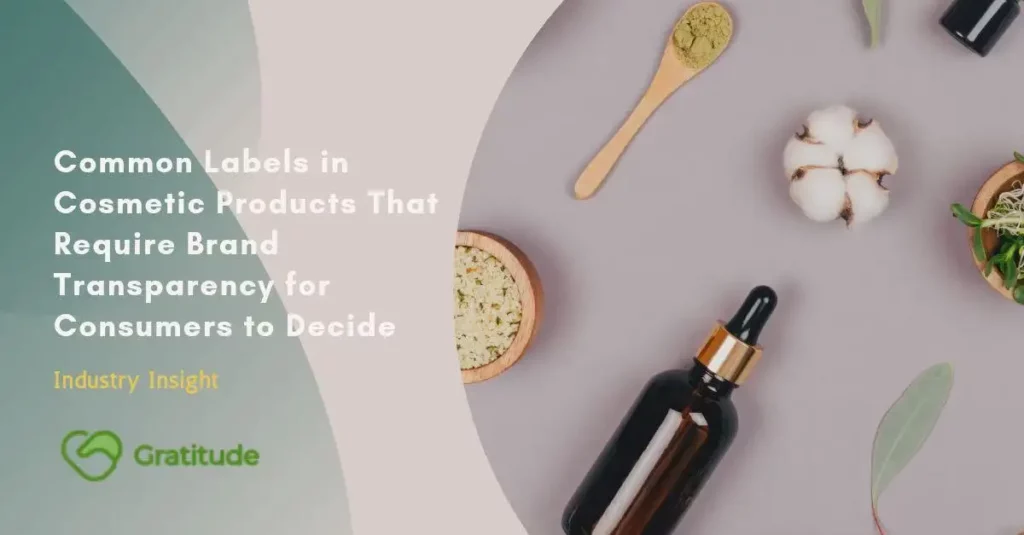
Cosmetic is a very delicate product as it is closely in contact with the consumer’s body, hence governments around the world often put strict regulations and requirements for cosmetic products. Yet it is a highly lucrative industry, with an estimated US$528.60bn in 2022 market size globally. With such high demand, bad actors oftentimes use unethical marketing practices or even cut corners with their ingredients to boost sales or increase profit margins. One of the most common ways to do so is by using vague claims or marketing jargon to make the product seems natural, healthy, or any other traits they want to claim the products to be.
Let us learn further what are the common labels that can be easily manipulated thus the consumer or ethical industry practitioner can avoid the practice altogether :
1. “Free of allergens”

It is not possible to guarantee that a cosmetic product would not be able to provoke an allergic reaction in highly sensitive individuals. Allergy is very individual and the claim above can hardly be documented. Thus, claims on the absence of allergenic substances are regarded as misleading.
What ethical products should do is for them to clearly mention common allergens such as peanuts, synthetic oil, and other allergens are available or unavailable in their ingredients and put them on an easy-to-discover label.
2. “Perfume-free”, “Unscented”, “No perfume added”

The “perfume-free” and “unscented” claims indicate that the product does not contain perfume, regardless of whether the substance has been added for another purpose, while “no perfume added” indicates that perfume has not actively been added. However, consumers are unlikely to distinguish between the various expressions. They will presumably all be taken to mean that the product does not contain perfume.
The EU has introduced compulsory declaration for 26 specific perfumes. If the product is labeled with one of the above claims and yet also contains one of these 26 allergenic perfumes, this will always be considered misleading marketing, regardless of the function the substance serves in the product. The same applies to all other known perfumes.
Essential oils and plant extracts may contain perfumes. If an essential oil or plant extract contains perfume, the above claims may not be used.
3. “Mild”, “Gentle” or “Naturally Occurring”

It is not possible to define in advance whether claims such as “mild”, “gentle” or “naturally occurring” constitute misleading marketing. Consumers will presumably interpret these expressions in varying ways. Each product and its marketing must therefore be assessed individually.
Expressions such as “mild, “gentle” and “naturally occurring” may create an expectation in the mind of the consumer that the product is better than other products. The marketers should therefore be very careful about using these expressions if the product contains a strong allergen. A strong allergen is a substance that has been found in practice to provoke an allergic reaction in a significant number of people.
Consumers may interpret “mild, “gentle” and “naturally occurring” claims as relating to something other than the pH value — such as the ingredients that have been used. It must therefore be clearly stated what these claims refer to, for example, the product’s properties, individual substances, the packaging, or something else.
Oftentimes brands do not have ill intention of not providing information about their product as they suppose to. Sometimes brands have difficulty conveying their product contents due to the limited capacity of their medium of choice such as printed labels. But the printed label can only show minimum information due to space constraints, therefore to show more detailed information, brands require another medium that can easily be put on the product yet is easy enough for consumers to read. Gratitude can become that solution.
Gratitude enables businesses to become transparent by being powered by blockchain technology, with easy-to-use tools to record their supply chain, narrate the story, verify on blockchain and present the data in a beautiful landing page that can be issued via Gratitude’s QR Code or URL that can be placed on a physical product or embedded on digital marketing campaign. Customers can then simply scan the QR codes placed on the product or click the link on a digital campaign and clearly see the product’s journey, verify sustainability claims, or any supply chain data that the company wants to reveal to the customer.
Begin your business’ true transparency journey by implementing Gratitude to unlock the hidden value of your supply chain data. Talk to our representatives via the following channels for support or assistance in implementation:
Website : https://more-gratitude.com
Twitter : https://www.twitter.com/more_gratitude
Linkedin : https://www.linkedin.com/company/more-gratitude
Instagram : https://www.instagram.com/more_gratitude/
Facebook : https://www.facebook.com/followgratitude
Medium : https://www.medium.com/@more_gratitude
Sign up to our exclusive newsletter for special offers and latest industry insight :

